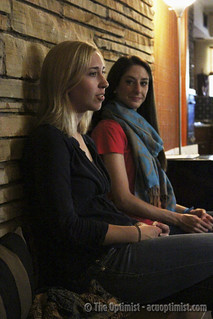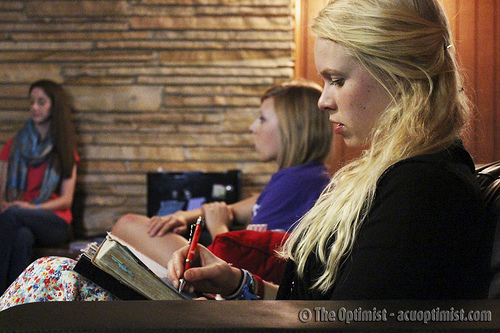It is the rising plague among the nation’s college campuses, a taboo topic gone unspoken and an affliction starving for awareness.
“Eating disorders are such a lonely disease,” said Emily Muhlberg, freshman marketing major from Boerne. “It shuts you down, makes you forget about everything you used to care about, and places unnecessary shame on you. They are such a taboo topic, and many people feel like they can’t go to anyone to talk about it or that no one understands.”
But that conversation is coming to the ACU campus’ surface.
We Are Not Alone, a student group, is taking on the task, spreading awareness of eating disorders and creating a support group for those affected by them.
The vision stemmed from Jordyn Boland, senior accounting major from Marshalltown, Iowa, who was inspired by years of struggling with a range of disordered eating habits during high school.
“When I started to get help is when I realized I needed to reach out to God,” she said. “He was going to tell me the truth and that was the only way that I was going to fight the lies that ED constantly was telling me.”
Boland said high school was a trying time, causing her to relapse her senior year. With the help of counseling, she has lived ED free ever since.
“Today I can say that I have been in recovery since I came to college,” she said. “I believe that God has saved me from so many bad things in life because he wants me to use my past for His glory.”
But for an age group categorized by freedom and fear of “the Freshman 15,” coming to college is the trigger for many who develop a disorder.
Ninety-five percent of those who have eating disorders are between the ages of 12 and 25.8, according to the National Association of Anorexia Nervosa and Associated Disorders.
“When I came to college that is when ED became so powerful in my life,” said Kai Cremer, junior psychology major from Albuquerque, N.M. “We view college as the time of freedom, freedom to do anything and have no one to tell us no. In the eyes of ED, it is a perfect opportunity to sweep in.”
Cara Flanders, a counselor in the Medical and Counseling Care Center, works with a variety of issues, but has been additionally trained in the area of eating disorders.
Fifty-six percent of the 600 students seen last year in the MaCCC identified with having body image concerns, she said.
“I have run an eating disorder support group in the past for ACU students, but think that many students are more comfortable with a grassroots group,” Flanders said.
At the beginning of this school year, Cremer shared with Boland her summer internship experience at an eating disorder treatment center. As both discussed their own eating disorders they felt called to create a support group on campus.
During Summit the two took advantage of an eating disorder session to go public with their plans.
“It was totally a God thing because I didn’t even know about the forum until a day before,” Boland said. “I went to and spoke up after about the group and about five girls joined us from the forum alone.”
WANA divides up into two different groups during their weekly Sunday meetings. One purposed as a support group for students struggling with eating disorders, and the second for students who would like to help raise awareness. Each group meets separately, but students can involve themselves in both. Boland said by dividing into small groups of about five girls allows for more relationship-building and openness in the group.
“I guess you could say we want this to be similar to A.A. or something where we keep it confidential so girls are more willing to be open,” Boland said. “Opening up about what is running through our heads is hard to do, but it is a huge step to recovery. We want to be able to help girls find their inner voice and, hopefully, this will help build girls up so that they can get help and let God’s voice be bigger than EDs.”
During the Tuesday Wellness Week Walk, the club had a table set up on the Lunsford Trail. At the table, WANA handed out fliers, displayed their upcoming t-shirt design and shared contact information.
“Now that Wellness Week is over we are going to start contacting RAs in the freshman and sophomore dorms and reaching out to their halls,” Boland said. “We want to have teams of two give their testimonies, share about the college life and how we’ve learned to cope with being out of control and insecure.”
Boland said they would like to participate in the NEDA (National Eating Disorders Association) walk next semester and host an event for the national ED awareness week in February.

Ashley Alexander-Burnette, senior high school education major from Whitehouse, and Taylor Newhouse, senior nutrition major from Montgomery, participated in a devotional and planned upcoming WANA events. (Optimist photo by Jarred Schuetze)
Part of the group’s purpose is putting faces to those statistics by sharing their stories of struggle.
Muhlberg’s battle with an eating disorder began at the age of twelve. Throughout her pre-teen years she was in and out of recovery, placed in both intensive outpatient and inpatient treatment facilities.
When Muhlberg was discharged in the summer of 2012, she said she was finally ready for a change, both physically and mentally.
“I was so sick of the eating disorder’s voice,” she said. “I plugged back into a counselor, an evening treatment program and was able to regain my footing. I have been pursuing recovery ever since.”
She became involved with WANA at Summit, realizing she was one of several who struggles.
“I know that when I was in the midst of my ED I thought I was the only person that felt the way I did,” Boland said. “Once I came to college I realized there were other girls that had the same thoughts and same issues who understand and don’t think I’m crazy.”
Even with eating disorders’ ever-increasing presence, WANA members said they realize others might be hesitant in coming public with participation in the group.
“Some people are uninterested and some people who do struggle or have struggled with this issue aren’t to the point where they feel comfortable opening up, both of which are very understandable,” Boland said.
“Admitting that I had an eating disorder was one of the hardest thing I could have ever done,” Cramer said. “I, and I’m sure the girls in WANA, can say that we know how it feels to be scared.”
The group incorporated 1 Thessalonians 5:9-11 into their mission statement as a testament to the Christian community they hope to provide. “For God did not appoint us to suffer wrath but to receive salvation through our Lord Jesus Christ. He dies for us so that, whether we are awake or asleep, we may live together with him. Therefore encourage one another and build each other up, just as in fact you are doing.”
“When ED starts to lie to me now I immediately fight back with God’s truth,” Boland said. “I am beautifully and wonderfully made. I am loved and I am perfect in God’s image. So it’s okay to be broken and mess up, because I can run into Jesus’ arms. This is the truth that has brought me to freedom from ED.”
WANA invites any student interested in learning more about the club to contact them at 13wana@gmail.com.

